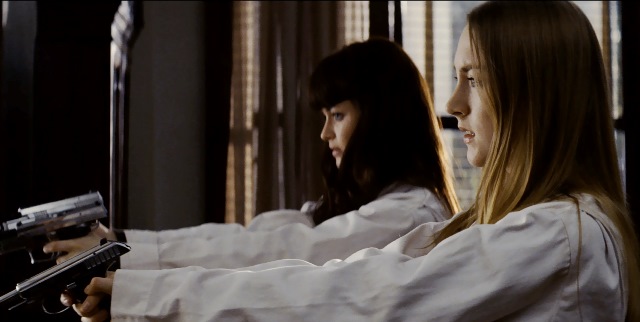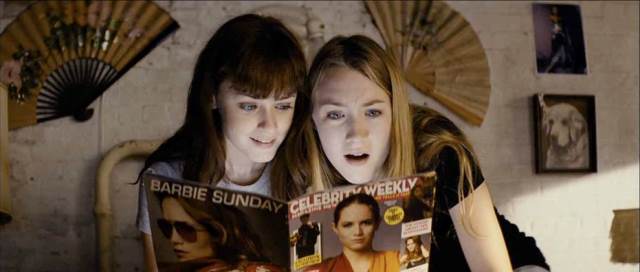CHICAGO – In anticipation of the scariest week of the year, HollywoodChicago.com launches its 2024 Movie Gifts series, which will suggest DVDs and collections for holiday giving.
Stylish ‘Violet & Daisy’ Wastes Talented Cast
 Rating: 1.5/5.0 |
CHICAGO – The premise of “Violet & Daisy” and the three actors at its center leave so much room for hope. That room slowly dissipates over the course of the film like air leaking out of a tire. Really? You’ve got this cast with this concept and this is the best you can do? Overly stylized to the point of suffocation, “Violet & Daisy” is the kind of tragic misfire that you just know must have been apparent while it was being made. You can almost see the moment when the super-talented Saoirse Ronan checks out in terms of character and I think James Gandolfini gave up before the end of rehearsal. I just felt bad for Alexis Bledel. Don’t see “Violet & Daisy” unless you want to feel bad for Alexis Bledel.
Written & directed by Oscar winner Geoffrey Fletcher (“Precious: Based on the Novel Push by Sapphire”), “Violet & Daisy” may have fit more snugly in the national consciousness in the mid to late ‘90s when every auteur on the planet was trying to fine tune that draft about hired killers due to a little movie called “Pulp Fiction.” The title refers to two hitwomen, a pair of young girls (and they really are “girls” in the sense that they lie on the bed and swoon over the latest pop star’s fashion and bounce up and down like on a bed but on the bodies of people they whacked) named Violet (Bledel) and Daisy (Ronan). They wear the number 8 and 9 on their outfits, respectively, to mark their position on the hit charts.

Violet and Daisy
Photo credit: Cinedigm
The film opens with the pair, heading to a hit dressed as nuns with pizza boxes (because THAT’S a sane cover) while Violet tells Daisy a bad joke that she doesn’t get. Immediately, one can sense that this is a film that doesn’t take place in the real world. It’s a film that only exists because of other superior films like it. Fletcher isn’t remotely interested in defining Violet & Daisy as characters. They’re hipster cinema clichés. Where did they work before they became killers? The doll hospital. Because that sounds clever. Not because it makes a lick of sense.
Violet & Daisy get an assignment from “Boss” to go kill a guy (Gandolfini) who has stolen from their employer. They arrive early to his place and promptly, as you know killers have never done, fall asleep. When they wake up, their intended target hasn’t taken their guns. He’s just sitting across from them, waiting for the inevitable. This throws Violet & Daisy. The rest of the film is essentially a long conversation (with a few flashbacks and asides) between Violet, Daisy, and a man who becomes something of a father figure given his desire to atone with his own daughter that will now go unfulfilled and two girls clearly in need of some paternal guidance.

Violet and Daisy
Photo credit: Cinedigm
And then “Violet & Daisy” ends. Almost as if it runs out of film. To say that “Violet & Daisy” needed more work in the final act is like saying a book hasn’t wrapped up the plot threads you hoped it would when you’ve got 100 pages to go. I was mostly just bored through “Violet & Daisy” but the non-ending, despite its use of the gorgeous “Verdi Cries” from 10,000 Maniacs, is simply offensive in its awfulness. Without spoilers, the non-ending really gives one pause as to whether or not Fletcher intended this as a pilot to a series. And every network said no.
Before then, “V & D” is really just dull. It’s not as aggravating as I suppose it could have been simply because the three players are better than average, although Gandolfini certainly doesn’t bring his all and Ronan is better than this material. She’s such a smart, engaging performer in films like “Atonement” and “Hanna” that one wonders who on Earth thought she should play such a shallow creation. You can see the actress’s frustration with the dialogue. That’s never a good sign.
 | By BRIAN TALLERICO |


